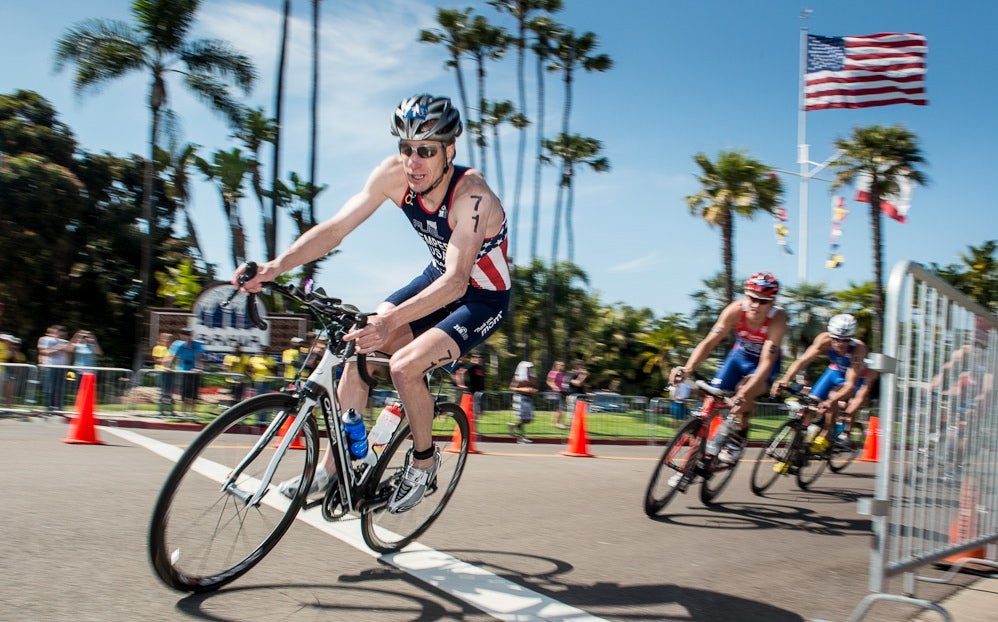Meet The U.S. Olympic Triathlon Team: Hunter Kemper

Photo: Nils Nilsen
If you try to draw correlations among the five U.S. triathletes going to the Olympics this year, good luck. There are some parallels, like their willingness to work hard and make sacrifices, as well as a few stories of overcoming adversity. But their journeys to where they are now are all over the map. Each day this week we’ll introduce you to a different member of the U.S. Olympic triathlon team. Today we’re telling the story of Hunter Kemper, who will be going to his fourth-straight Olympics as a member of Team USA.
Frustration is an understatement when you’re helpless in bed attached to an IV and pick line knowing that you’re there due to a circumstance out of your control. In October of 2011, Hunter Kemper was hit by an amateur athlete while going 35 mph on his bike during a race in Myrtle Beach, S.C., leaving him with a broken elbow. The situation turned into a bigger nightmare than he could have ever fathomed.
“When I went down I didn’t realize how bad it was,” he said. “The next few months were a roller coaster ride. Initially I got a plate and 13 screws in. Then it got infected around Thanksgiving, and come Christmas I got a staph infection.” Kemper traveled to Vail, Colo., where he underwent three surgeries in three consecutive days to clean it out. He was left bed ridden for two weeks, and on and IV drip and pick line for six weeks.
“That’s a point where you definitely have doubts,” he said. “You can’t not when you’re in a place that you never thought you’d be, and that out of shape—and this was in January [2012, with the big race in May].”
He kept his situation private; only those who needed to know were aware. He didn’t need his competitors cognizant of his condition so close to the ‘A’ race at ITU World Triathlon Series San Diego. “I didn’t want to give them that mental edge,” he said. “I’d just say, ‘I’ll be coming back; things are OK.” It was a tough journey but, finally, just two weeks before San Diego he felt like the worst was behind him and that he could execute. And that he did, finishing fifth at San Diego to earn a spot on the Olympic Team.
Looking back at the injury, he realizes it could have been blessing in disguise—Kemper was fresh and more eager and appreciative to be racing than ever before—but he’s also ready to move on. “That was my journey, and it makes you appreciate things,” he said, “but it’s a negative thing that I don’t like to talk much about. I need to stay positive.”
RELATED: Hunter Kemper’s “Brutal” Journey To Fourth Olympics
And there’s much to be positive about. Kemper is one of only three triathletes in the world who will have been to all four Olympics Games that have included triathlon since the sport’s inclusion in the Games in 2000—the other two triathletes being Canada’s Simon Whitfield and Germany’s Anja Dittmer. “I feel like it’s a cool club to be in,” he said. “There’s a sense of pride with that.”
Heck, he’s also the first triathlete to ever make it on a Wheaties box. There’s much to be prideful about when you’re Hunter Kemper. But there’s also a sense of unfinished business. “As a kid I always dreamed about winning a medal, any color,” he said. “I feel I need to do that, so I’m hoping London is my day. I know I’m capable this year. If I were to go to [the 2016 Games in] Rio I don’t know if that’d be the case.”
Kemper knows it’s about being able to perform on the day—not an easy feat, but one that he’s good at. After all, who bounces back after an injury like his to go top-five at one of the toughest races in triathlon? He’s prepared to battle with the likes of the Brownlees.
The question is, then, will Kemper, who’s 36 now, go for five Olympics? “Next up I’ll do more non-drafting Olympic races, trying to win the Hy-vees. And when 2016 comes around and Rio is there, I would love to be on that start line at Olympic trials, with the other guys thinking, ‘Wow that guy is old but we don’t know what to expect out of Hunter because he’s always been in the Olympic Games; this guy could do it again.’ That would give a 20 second advantage right there,” he jokes.